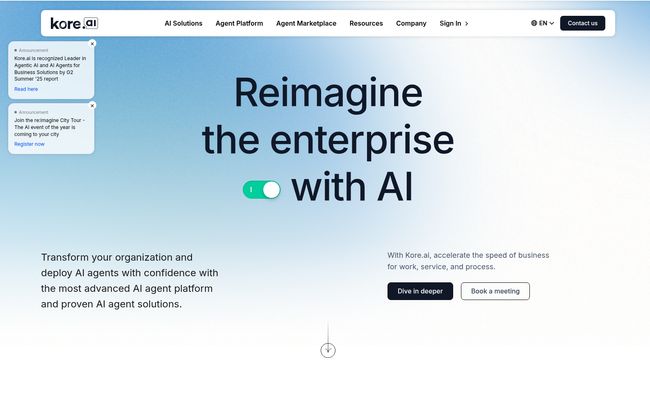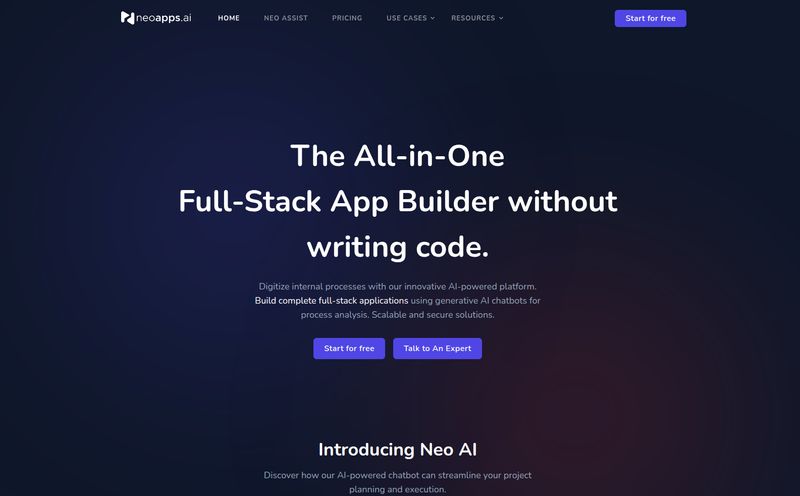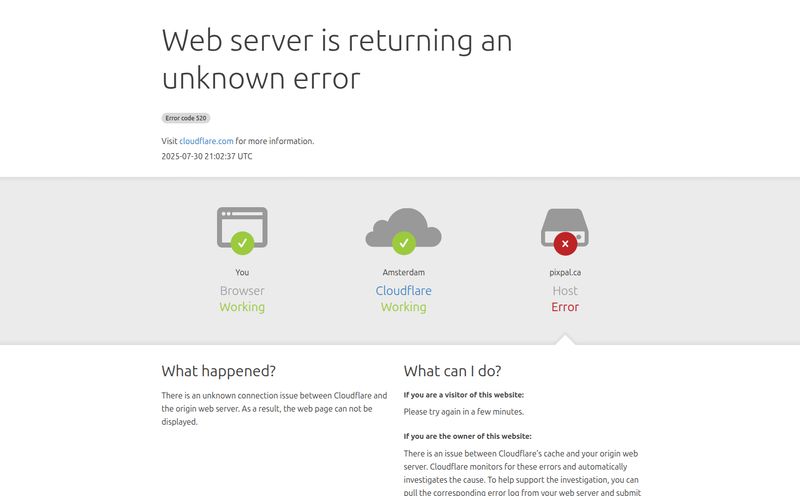We’ve all been on the receiving end of a truly terrible chatbot. You know the one. It gets stuck in a loop, offers you three irrelevant options, and makes you want to throw your laptop out the window. For years, the promise of “conversational AI” felt a lot like that—a clunky, frustrating experience that created more problems than it solved.
I’ve been in the digital marketing and SEO space for a long time, and I’ve seen countless tools promise to revolutionize customer interaction. Most of them were just prettier versions of the same old scripted decision trees. But every now and then, a platform comes along that makes you sit up and pay attention. For me, recently, that platform has been Kore.ai.
This isn't just another chatbot builder. It's aiming for something much, much bigger. Think of it less as a single tool and more as an AI-powered central command center for your entire business. A pretty bold claim, right? Let's see if they can back it up.
So, What Exactly Is Kore.ai?
At its core, Kore.ai is an enterprise-grade AI platform designed to build and manage smart virtual assistants. But that's a bit of an understatement. The magic here isn’t just about creating a single bot for your website. It's about creating a whole ecosystem of AI agents that can talk to each other, your existing systems, and, of course, people.
The company splits its offerings into three main pillars, which I think is a pretty smart way to frame it:
- AI for Service (Customer Experience): This is the one most people will think of first. It’s about automating customer service conversations across channels like your website, social media, and even over the phone (voice). The goal is to resolve issues faster, 24/7, without burning out your human agents.
- AI for Work (Employee Experience): This is where things get really interesting for me. Kore.ai can be used to build internal-facing assistants. Imagine an AI that can help new hires with onboarding, answer HR questions, or help your IT team manage support tickets. The potential to reduce internal friction and free up your team’s time is just massive.
- AI for Process (Process Automation): Think of this as the connective tissue. This part of the platform focuses on automating complex business workflows that involve multiple steps and systems. It’s the behind-the-scenes workhorse.

Visit Kore.ai
The whole idea is to have a single, unified platform to rule them all. No more duct-taping five different AI tools together and praying they work. This approach provides a level of governance and control that most enterprise-level companies are crying out for, especially with the explosion of different LLMs and AI tools out there.
Building Your AI Army, Even Without a Computer Science Degree
One of the biggest hurdles with powerful tech is, well, how to actually use it. You can have the most sophisticated platform in the world, but if it takes a team of PhDs six months to get anything done, it's not very practical. Kore.ai seems to get this. They've adopted a hybrid approach with both no-code and pro-code tools.
The No-Code Playground
For the non-developers among us (hello!), the platform includes a visual, drag-and-drop builder. You can design conversation flows, train the AI on your specific business lingo, and set up basic integrations without writing a single line of code. They even have an AI Agent Marketplace with pre-built templates for common use cases like IT helpdesks or lead qualification. This dramatically lowers the barrier to entry. You can get something up and running in days, not months.
The Pro-Code Powerhouse
For the development teams who want to get their hands dirty, there are pro-code extensions and SDKs. This is crucial. It means you're not locked into the platform's limitations. If you need a super-specific, complex integration with a legacy system or want to build a truly unique function, you have the freedom to do so. This flexibility is what separates a serious enterprise tool from a simpler, more restrictive product.
What Really Sets It Apart?
Okay, so it’s a big, integrated platform. Lots of companies claim that. But when you look closer, a few things stand out. Their website talks about Speed, Control, Flexibility, Depth, and Experience. Marketing speak? Maybe a little. But there’s substance here.
The real differentiator, in my opinion, is the multi-agent orchestration. This is a fancy way of saying their AI agents can work together. For instance, a customer might start a conversation with a service bot. That bot might realize the customer has a complex billing issue, so it intelligently hands the conversation over to a specialized billing process bot, which then accesses the billing system to resolve the problem. It’s like having a team of specialized AI employees who know exactly when to pass the baton. This is lightyears ahead of a single, monolithic chatbot trying to do everything.
And let's not forget the big-picture stuff that C-suites love: security and compliance. Kore.ai is clearly built for large organizations that can't afford to play fast and loose with data. They offer enterprise-grade security, governance controls, and the ability to deploy on-premise or in a private cloud. This is a non-negotiable for industries like finance and healthcare. Seeing names like Morgan Stanley and Microsoft on their partner/customer list tells you they take this stuff seriously.
The Not-So-Shiny Bits: Hurdles and Pricing
Alright, no tool is perfect. And it wouldn’t be a real review if I didn’t talk about the potential downsides. Based on what I've seen and the nature of platforms like this, there are a few things to consider.
First, there's likely a learning curve. Yes, the no-code tools are great for getting started, but to truly harness the full power of a platform this comprehensive, you're going to need to invest time in training and understanding its architecture. This isn’t a simple plug-and-play widget.
Second, and this is the big one for smaller companies, is the price. Kore.ai doesn’t list pricing on its website—you have to book a meeting or contact sales. This is typical for enterprise software, and it usually means it’s not cheap. For a small business or a startup, the cost might be a significant barrier. This platform is squarely aimed at mid-to-large enterprises with complex needs and the budget to match.
Finally, while the no-code builder is powerful, some deep customization might still push you into the pro-code world. If your needs are very niche, you'll want to make sure you have the developer resources on hand to support it.
Frequently Asked Questions About Kore.ai
1. Is Kore.ai just for customer service chatbots?
Absolutely not. While it has a strong customer service solution (AI for Service), its real strength lies in being a platform for the whole enterprise, including employee-facing assistants (AI for Work) and business process automation.
2. Do I need to be a developer to use Kore.ai?
No. The platform offers a robust no-code tool, the 'Experience Optimization Platform', which allows business users to design, build, and train conversational AI agents using a visual interface. However, developer skills are needed for more advanced customizations and integrations.
3. Who is the ideal customer for Kore.ai?
It seems best suited for mid-to-large enterprises that need to manage multiple automated processes and conversations across different departments. Companies in regulated industries like finance, healthcare, and telecom would benefit from its security and governance features.
4. How much does Kore.ai cost?
Kore.ai uses a custom pricing model. You won't find a price list on their site. You'll need to contact their sales team or book a demo to get a quote based on your specific needs, which is standard practice for enterprise-level solutions.
5. How is this different from just using an API from OpenAI or Google?
Think of it as the difference between being given a car engine and being given a whole car. APIs from OpenAI give you the powerful engine (the language model), but Kore.ai provides the entire vehicle: the chassis (security, governance), the dashboard (analytics, no-code tools), the wiring (integrations), and the steering wheel (orchestration) to actually make it useful and safe for a business to drive.
The Final Verdict
So, is Kore.ai the real deal? In my book, yes—for the right kind of company. If you're a small shop just looking for a simple chatbot for your homepage, this is probably overkill. It'd be like using a sledgehammer to crack a nut.
But if you're part of a larger organization struggling with disconnected systems, inefficient workflows, and the desire to implement a true, scalable AI strategy, then Kore.ai is one of the most compelling platforms I've seen. It moves the conversation beyond just 'bots' and into the realm of a fully integrated AI workforce. And in a world where customer and employee experience are major ranking factors for success (and for SEO, wink wink), that's a very powerful proposition indeed.
References and Sources
For more detailed information directly from the source, or to book a demo, visit the official website:
Kore.ai has also been recognized as a leader in industry reports, such as those by Forrester. You can typically find these reports mentioned on their site or through a quick search:
- Forrester Research (for reports on The Forrester Wave™: Conversational AI)



